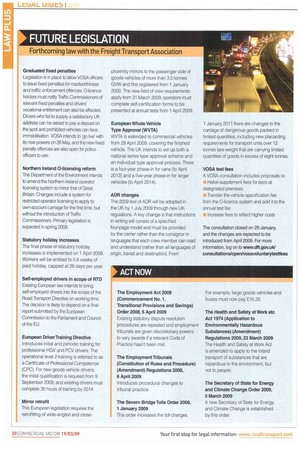Forthcoming law with the Freight Transport Association
Page 30

If you've noticed an error in this article please click here to report it so we can fix it.
Graduated fixed penalties
Legislaton is in place tc ailow VOSA officers to issue fixed penalties for roadworthiness and traffic enforcement offences. 0-licence holders must notify Traffic Commissioners of relevant fixed penalties and drivers' vocational entitlement can also be affected. Drivers who fail to supply a satisfactory UK address can be asked to pay a deposit on the spot and prohibited vehicles can face immobilisation. VOSA intends to 'go live' with its new powers on 28 May, and the new fixed penalty offences are also open for police officers to use.
Northern Ireland 0-licensing reform The Department of the Environment intends to amend the Northern Ireland operator licensing system to mirror that of Great Britain. Changes include a system for restricted operator licensing to apply to own-account carriage for the first time, but without the introduction of Traffic Commissioners. Primary legislation is expected in spring 2009.
Statutory holiday increases The final phase of statutory holiday increases is implemented on 1 April 2009. Workers will be entitled to 5.6 weeks of paid holiday, capped at 28 days per year.
Self-employed drivers in scope of RTD Existing European law intends to bring self-employed drivers into the scope of the Road Transport Directive on working time. The decision is likely to depend on a final report submitted by the European Commission to the Parliament and Council of the EU.
European Driver Training Directive Introduces initial and periodic training for professional HGV and PCV drivers. The operational level 2 training is referred to as a Certificate of Professional Competence (CPC). For new goods vehicle drivers, the initial qualification is required from 9 September 2009, and existing drivers must complete 35 hours of training by 2014
Mirror retrofit This European legislation requires the retrofitting of wide-angled and close proximity mirrors to the passenger side of goods vehicles of more than 3.5 tonnes GVVV and first registered from 1 January 2000. The new field of view requirements apply from 31 March 2009; operators must complete self-certification forms to be presented at annual tests from 1 April 2009.
European Whole Vehicle Type Approval (WVTA) VVVTA is extended to commercial vehicles from 29 April 2009, covering the finished vehicle. The UK intends to set up both a national series type approval scheme and an individual type approval process. There is a four-year phase-in for vans (to April 2013) and a five-year phase-in for larger vehicles (to April 2014).
ADR changes The 2009 text of ADR will be adopted in the UK by 1 July 2009 through new UK regulations. A key change is that instructions in writing will consist of a specified four-page model and must be provided by the carrier rather than the consignor in languages that each crew member can read and understand (rather than all languages of origin, transit and destination). From 1 January 2011 there are changes to the carriage of dangerous goods packed in limited quantities, including new placarding requirements for transport units over 12 tonnes tare weight that are carrying limited quantities of goods in excess of eight tonnes.
VOSA test fees A VOSA consultation includes proposals to: Halve supplement fees for tests at designated premises Transfer the vehicle specification tee from the 0-licence system and add it to the annual test fee Increase fees to reflect higher costs
The consultation closed on 29 January, and the changes are expected to be introduced from April 2009. For more information, log on to www.dft.gov.uk/ consultations/open/vosavoluntarytestfees
















































































































































